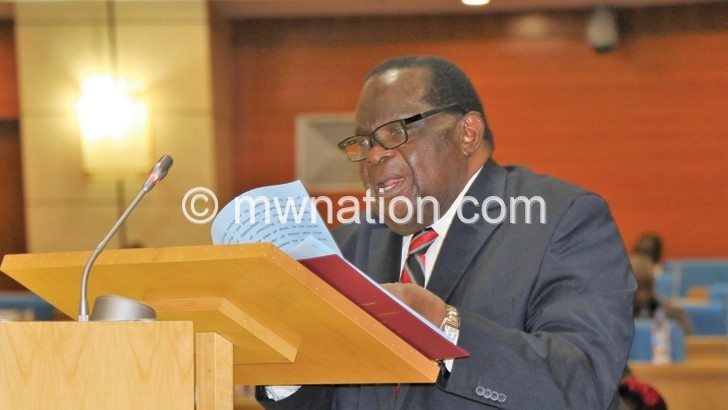Budget youth Focus queried
Civil society organisations (CSOs) and a political analyst have punched holes in government’s new job-creation plan for the youth, describing it as cosmetic and only meant to woo young voters in the 2019 Tripartite Elections.
The CSOs and the political commentator were reacting to an announcement in the Budget Statement Minister of Finance, Economic Planning and Development Goodall Gondwe delivered in Parliament on Friday which stated that government will from July this year employ about 17 000 youths nationwide in various sectors.
The minister said K9.8 billion is earmarked for youths for tree planting and internships.

But Youth and Society (YAS) executive director Charles Kajoloweka noted that the Democratic Progressive Party (DPP)-led government is targeting the youth on an appeasement drive belatedly, just to win their votes
He said: “The 2018/19 National Budget is more political than empowering the youth because since 2014, government has never committed itself to empowering the youth.
“Suddenly, it now comes up with programmes, without engaging the youth actors who can give direction. This shows that the government is panicking to secure deliverables as we are heading towards elections.”
Kajoloweka wondered why government is engaging the youth now by dangling jobs to them. He said the efforts will not be sustainable beyond the polls.
He said: “Much as we appreciate government’s commitment to employing the youth, one major challenge on the youth projects has been corruption and abuse of the young people. For example, Mzuzu Youth Centre stalled several years ago even if millions of kwacha got spent without any notable structure to show for this. We do not think it will keep empowering the youth beyond 2019.”
In a separate interview, Centre for the Development of People (Cedep) executive director Gift Trapence agreed with Kajoloweka that the 2018/19 financial plan is a campaign tool seeking the youth’s votes.
He said: “What government is doing is plastic surgery, where it wants to be seen as if it is doing something when it is not doing anything significant. Youth employment ought to address the bigger picture and not only the targeted few.
“We have noted that government has no clue on what it can do to end unemployment because the economy is not growing.”
Trapence said that the government has a bad track-record of failing to employ medical doctors and teachers who graduated from their respective colleges several years ago.
He said: “The fact that the recruitment will soon commence this year, as reflected in the 2018/19 budget, raises suspicion that this is a short-lived mechanism aimed only at increasing political mileage before the elections.”
Since assuming power after the May 20 2014 Tripartite Elections, government has been introducing community colleges nationwide as a strategy for tackling unemployment among the youth. But the initiative seems unsustainable because many youths equipped with vocational skills still lack resources, including capital.
Chancellor College-based political scientist Ernest Thindwa also described the initiative government has taken to employ the youth as unsustainable because it is reactive and not proactive.
He predicted that the initiative will be abandoned after the elections because the elite seem more interested in winning the elections than in transformational development.
Thindwa said: “Whatever every politician does as elections approach is aimed at amassing votes. Whatever they do is about vote maximisation.
“But if the key issue of youth employment in the budget resonates with collective needs of national interests, then there is no political manipulation. But where the action serves personal interests, that becomes a problem.”
But Minister of Information and Communications Technology Nicholas Dausi dismissed the fears that the youth employment initiatives are cosmetic, saying the government developed a five-year master plan from which the youth will benefit.
He said: “In fact, I wonder why they say the initiative will not be sustained because the Minister of Finance spelt out youth employment initiative in the five-year master plan. The youth who will be trained and employed will put government ideas into reality, thereby sustaining the country’s economic growth.”
United Democratic Front (UDF) president Atupele Muluzi, who is also Minister of Health and Population, recently emphasised the need to include youths in decision-making positions within the party structures.
He pointed out that the party cannot expect to win in the 2019 polls without the involvement of the youth—who are in majority in the country’s population.
The youth form a majority constituency for votes in the country. However, over the years, observers have argued that the youth have been denied meaningful empowerment, with politicians mostly using them to incite violence against their rivals. n





